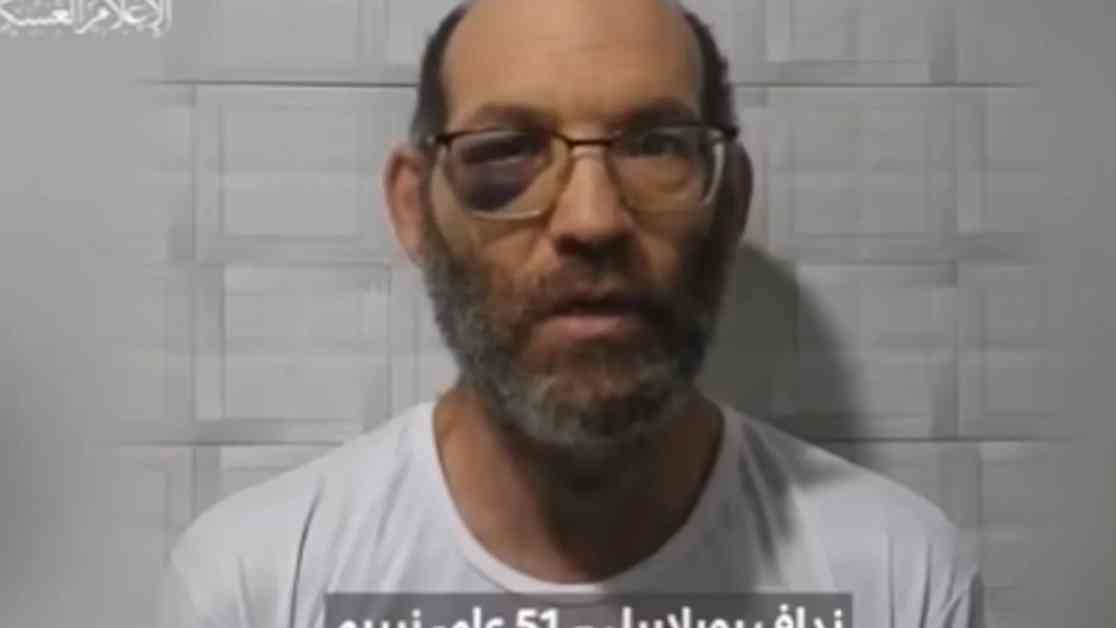The discovery of a Briton’s body in a Hamas tunnel in Gaza has raised questions and concerns about the circumstances surrounding the tragic incident. The body of Nadav Popplewell, a 51-year-old man originally from Wakefield, West Yorkshire, was found with gunshot wounds along with five other Israeli hostages who appeared to have been executed. The grim discovery was made by the Israel Defence Forces more than 30 feet below ground, behind a false wall in a tunnel shaft in Khan Younis. It is believed that four bodies found nearby were those of terrorist guards.
Nadav Popplewell’s sister, Ayelet Svatitzky, had been advocating for his release prior to the tragic discovery. Their mother, Channah, who is 79 years old, had been freed during a brief ceasefire last November. Tragically, another brother of Nadav, Roi Popplewell, 54, was shot dead during the October raids. The family’s ordeal highlights the devastating impact of the conflict in the region and the toll it takes on innocent lives.
Ceasefire talks have stalled, and hopes for the remaining captives are fading as Israeli troops close in on Hamas leader Yahya Sinwar. The Hostages and Missing Families Forum has emphasized the urgency of reaching a deal to secure the release of any surviving hostages. The longer the negotiations drag on, the greater the risk to those still held captive and the more anguish for their families.
The situation is dire, with records indicating that there are 109 hostages in Gaza, but analysis suggests that only about 50 may still be alive in Hamas-controlled hideouts. Israeli Prime Minister Benjamin Netanyahu’s efforts to broker a compromise plan were met with rejection by Hamas chief Sinwar, further complicating the delicate negotiations. The need for swift action to secure the release of the hostages and bring an end to the suffering of their families is paramount.
Uncovering the Truth
The discovery of Nadav Popplewell’s body and the other hostages in the Hamas tunnel has shed light on the brutal realities of the conflict in Gaza. The presence of gunshot wounds on the bodies indicates that they were likely executed, raising questions about the circumstances leading to their deaths. The hidden location of the tunnel behind a false wall underscores the clandestine and dangerous nature of the operations carried out by militant groups in the region.
The Israel Defence Forces’ operation to uncover the hostages and the weapons in the tunnel highlights the ongoing security challenges faced in Gaza. The presence of Hamas weapons in the tunnel further underscores the need for vigilance and decisive action to combat terrorism in the area. The tragic fate of Nadav Popplewell and the other hostages serves as a stark reminder of the human cost of the conflict and the urgent need for a resolution to end the cycle of violence.
A Family’s Agony
The ordeal faced by the Popplewell family is a heartbreaking example of the toll that conflict can take on innocent civilians. Ayelet Svatitzky’s efforts to secure her brother’s release, along with the tragic loss of another family member, highlight the profound impact of the crisis on individual families. The anguish of not knowing the fate of loved ones held captive in Gaza is a burden that no family should have to bear.
Channah Popplewell’s release during a ceasefire last November offered a glimmer of hope for the family, only to be shattered by the discovery of Nadav’s body in the Hamas tunnel. The uncertainty surrounding the fate of the remaining hostages compounds the family’s grief and uncertainty. The emotional toll of waiting for news of their loved ones’ fate is a heavy burden that weighs heavily on the hearts of those left behind.
The Popplewell family’s story is a tragic reminder of the human cost of conflict and the need for swift and decisive action to secure the release of hostages held in Gaza. The international community must come together to support efforts to bring an end to the suffering of innocent civilians caught in the crossfire of the conflict. The urgency of the situation demands a coordinated and resolute response to ensure the safe return of all hostages and the resolution of the crisis.
Urgent Calls for Action
The Hostages and Missing Families Forum’s plea for a swift resolution to secure the release of the remaining captives in Gaza underscores the urgency of the situation. The longer the negotiations drag on, the greater the risk to the hostages and the more anguish for their families. Every day that passes without a resolution increases the danger faced by those held captive and prolongs the suffering of their loved ones.
Israeli Prime Minister Benjamin Netanyahu’s support for a compromise plan to secure the hostages’ release was a hopeful sign, but the rejection by Hamas chief Yahya Sinwar has complicated the negotiations. The need for both sides to come to the table and find a mutually acceptable solution is critical to ensuring the safe return of the hostages and the resolution of the crisis. The international community must continue to pressure both parties to prioritize the well-being of the hostages and work towards a peaceful resolution.
The fate of the remaining hostages in Gaza hangs in the balance, with their families anxiously awaiting news of their loved ones’ fate. The emotional toll of uncertainty and fear is a heavy burden that must be lifted through decisive action and diplomatic efforts. The world must not turn a blind eye to the suffering of innocent civilians caught in the crossfire of conflict and must work together to bring an end to the crisis in Gaza. The time for action is now, before more lives are lost and more families are torn apart by the unrelenting violence in the region.

